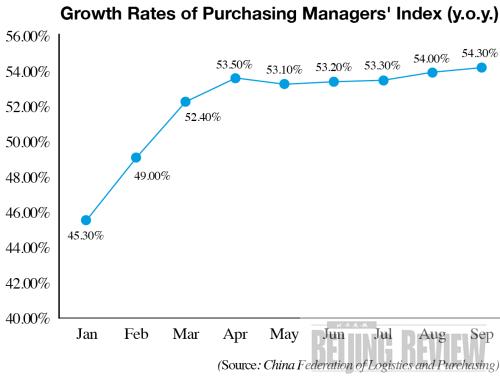| 
Numbers of the Week
570 billion yuan
China's retail sales of consumer goods totalled 570 billion yuan ($83.5 billion) during the National Day holiday this year, up 18 percent compared with the same period last year, the Ministry of Commerce said.
322.41 billion kwh
China's power consumption in September rose 10.24 percent year on year to 322.41 billion kwh in September, according to the China Electricity Council.
TO THE POINT: By allowing foreign investors greater access to Chinese equities, regulators try to firm up the fickle stock markets. China's export woes show signs of healing, though uncertainties still loom large. Regardless of controversies swirling around the deal, the Sichuan heavy machinery maker Tengzhong agrees to buy the General Motors Co.'s Hummer brand. China's auto market burns hot as September sales soared 77.88 percent year on year. Citibank China has recently opened its third lending company in China.
By HU YUE
A Boost to QFII
With stock markets on a roller coaster ride, many Chinese investors are increasingly asking themselves the same question: Are we in a new bear market or in the midst of a shallow retreat in a bull market?
The Shanghai A-share market has returned 14 percent of its value since early August after a prolonged rally. Among the many downsides that darken trade sentiment, one stands out—there is a lack of institutional investors with long-term horizons that act as stabilizers against the simmering volatility. When domestic investors grow wary of the fickle markets, their foreign counterparts may more or less provide some cushion.
On September 4, the State Administration of Foreign Exchange (SAFE), the country's foreign exchange regulator, unveiled a draft circular to raise the amount that foreign funds can invest in Chinese equities from $800 million to $1 billion. It also intends to shorten the lock-up period for foreign insurers and pension funds from one-year to three months.
China's qualified foreign institutional investor (QFII) program allows large foreign institutions limited access to Chinese equity markets. The total quota currently stands at $30 billion, but less than $15 billion had been allocated to some 78 institutional investors by the end of September.
Though the QFII portfolios only amount to a small fraction of the market size, the move sends out a strong signal that policymakers will not leave the market to find equilibrium on its own, said Guo Yanhong, a senior analyst with the Shenzhen-headquartered Ping An Securities Co. Ltd., in an interview with the Securities Daily.
The only uncertainty lies in their cash flows and risk appetite after going through the destructive financial crisis, she added.
Long Way to Recovery
While most major economies are still reeling from the economic recession, China is powering ahead. Even on the once-bleak trade front, a mood of optimism seems to be returning as September data give a clear sign that the worst is over.
According to the General Administration of Customs, China's exports in September dropped 15.2 percent year on year to $115.9 billion, with the decline rate slowing down significantly. But on a monthly basis, this represented a growth of 11.8 percent. Imports stood at $103 billion, 17 percent higher than those in August.
The government stimulus and a small uptick in Christmas orders from Western countries came as a needed boost for Chinese exporters, said Ha Jiming, chief economist with the Beijing-based China International Capital Corp. Ltd. In addition, modest inventory restocking by U.S. importers also improved September numbers, while the third quarter already appears to be in the midst of a slight recovery compared to the same time in 2008, he added.
The Asian Development Bank even predicted in a report that China's exports were likely to bounce back to a positive growth trend in the fourth quarter of this year.
A big part of the challenge is that foreign consumers who live paycheck to paycheck are hamstrung by a dim job market, said Guo Tianyong, an economist with the Central University of Finance and Economics.
Meanwhile, pressures are proliferating for the Chinese currency to appreciate as the U.S. dollar weakens. But the policymakers are less likely to risk putting exporters in jeopardy by allowing the renminbi to rise, he added.
A Blessing or a Curse?
The Chinese machinery maker Tengzhong Heavy Industrial Machinery Co. Ltd. inches closer toward buying Hummer, though it remains to be seen whether the deal will have a happy ending.
| 